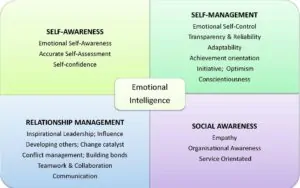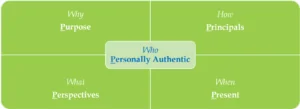How Everyday Legacy Mindsets Grow Your Emotional Intelligence
by Robert Hackman
Photograph by Tengyart on Unsplash
When will emotional intelligence be half as relevant as how much we just need to be right?
From the song ‘American Discourse’
By David J. Henning
While preparing a segment of facilitation about Emotional Intelligence for a group of leaders focused on gun violence prevention at a non-profit area, I was struck by its relationship to Everyday Legacy Mindsets.
Years ago, psychologist and author Daniel Goleman made the case that Emotional Intelligence (EQ) correlates more closely with success than Intelligence Quotient (IQ). In other words, knowing how to relate to yourself and other people and navigate social situations is more important than your ability to think, learn, and problem-solve.
Emotional Quotient (EQ) measures the ability to understand and manage your emotions, social awareness, and relationships.
It acknowledges that the ability to work with people to get things done with and through them over time is a vital leadership skill.
What exactly is Emotional Intelligence? How does it relate to Mindset? How do Everyday Legacy Mindsets help grow your Emotional Intelligence?
What is Emotional Intelligence?
Emotional Intelligence refers to a group of skills and attributes required to relate well with others and navigate our social environment. It is broken down into four primary areas: Self-Management, Self-Regulation, Social Awareness, and Relationship Management. Motivation, a fifth element, refers to the degree of resilience and the capacity to persevere through adversity.
Developing and using Emotional Intelligence is more essential than ever as leaders determine ways to grapple effectively with increasingly complex work environments consisting of in-person, remote, and hybrid combinations.
Understanding Emotional Intelligence is your first step to improving it. Knowing its components helps you pay attention to them. Awareness is not enough, however. You must develop the skills you need to use. But how?
How Does Emotional Intelligence Relate to Mindsets?
The foundation of EQ is consciousness because you cannot regulate and manage what you are unaware of. Mindsets have everything to do with what you allow into your consciousness. They determine how you interpret what you see, the way you evaluate your experiences, and where you place your attention. Mindsets, mental attitudes, and inclinations. They are a collection of thoughts and beliefs that inform how you make sense of the world. They are habits of thought.
Leaders frequently get promoted because of their success as producers and proficiency in specialized skills. Yet, these skill sets do not prepare them to lead. Leaders need to acquire other types of skills, and they need help and support to do so.
Leadership is about followership. Without willing followers, there are no leaders. Thus, leaders must learn to enlist others, influence them, and navigate their relationships with them over time.
Leaders who do not recognize their impact on others undermine their ability to relate to others meaningfully, compromising their capacity to lead.
A quick reference guide to Emotional Intelligence is in the chart below.
There are many aspects of Emotional Intelligence. It is a lot to remember – too much.
How do Everyday Legacy Mindsets help Grow Your Emotional Intelligence?
Everyday Legacies are defined by your impact on others, your environment, and what you leave behind through every interaction. Thus, Everyday Legacy Mindsets consist of inclinations that prime you to focus on your effect on others. They bring noticing the way you relate to others and how they respond to you to the forefront of your approach.
Because Everyday Legacy Mindsets are habits of thought, they translate into your actions and how you relate. They create a lens through which you view your relationship with yourself, others, the environment, and the differences you seek to make.
Everyday Legacy Mindsets represent a holistic approach that eliminates needing to remember specifics.
A quick reference guide to the elements of Everyday Legacy Mindsets is below.
The Five Ps of Everyday Legacy Mindsets advance the development of Emotional Intelligence.
Everyday Legacy Mindsets call on you to define your Purpose and articulate your highest Principles. Aligning your decision-making, words, and behaviors with them builds self-confidence and elicits confidence from others. Others know what you care about and where you come from.
Gaining clarity of Purpose strengthens your resilience in the face of adversity.
Committing to Personal Authenticity leads to consistent behavior, which invites the vulnerability required for psychological safety and trusting relationships. Others can rely on who you are and that you will give them room to be who they are.
Continually bringing yourself back to the Present moment attunes you to yourself, others, and the interpersonal dynamics between you. Being present allows you to recognize how you are breathing and how your body responds to the situation. Noticing these early indications of your feelings increases your likelihood of regulating them.
Intentionally staying open to different Perspectives permits you to accept others without necessarily agreeing with them, facilitating rapport.
Integrating the Five Ps of Everyday Legacy Mindsets makes you a potent leader. They represent the why, how, who, when, and what of how you show up. Being in touch with your emotions allows you to regulate them. It enables you to focus outwardly on others – because you are not preoccupied with yourself – and navigate the dynamics between you.
No one will remember all of the elements of Emotional Intelligence, especially when they need to recall them, making them challenging to implement.
However, adopting Everyday Legacy Mindsets as habits of thought naturally inclines you to pay attention to the collection of skills and attributes that comprise Emotional Intelligence.
Skillful leadership is complex. Emotional Intelligence is crucial. Everyday Legacy Mindsets gives you a viable shortcut for growing your Emotional Intelligence toolbox and using it reliably.
Worthy contemplations:
- Does Emotional Intelligence make sense to you? Do you believe it is necessary to be a skillful leader?
- How would you rate your current level of Emotional Intelligence? How would your colleagues and associates rate you? Are you willing to find out?
- Does identifying your Purpose and highest Principles build your confidence and engender the confidence of others? How do confidence and trust impact your relationships?
- Now that you better understand Emotional Intelligence, how will you develop yours, your team’s, and your organization’s? What role can Mindsets play?
- Do you recognize how Everyday Legacy Mindsets grow Emotional Intelligence? If so, are you willing to adopt them?
If you want to discuss ways to develop and grow your leadership to benefit yourself, your team, your family, or your organization, please reach out to me. I welcome the connection.
Robert Hackman, Principal, 4C Consulting and Coaching, helps people live and lead with fewer regrets. He grows and develops leaders through executive coaching consulting, facilitation, and training of individuals, teams, and organizations. He is committed to Diversity, Equity, and Inclusion. He facilitates trusting environments that promote uncommonly candid conversations. Rob is also passionate about the power of developing Everyday Legacy Mindsets and has conducted over 50 Legacy interviews with people to date.
A serious man with a dry sense of humor who loves absurdity can often be found hiking rocky elevations or making music playlists. His mixes, including Pandemic Playlists and Music About Men, among others, can be found on Spotify.
Bravely bring your curiosity to a conversation with Rob, schedule via voice or text @ 484.800.2203 or rhackman@4cconsulting.net.



